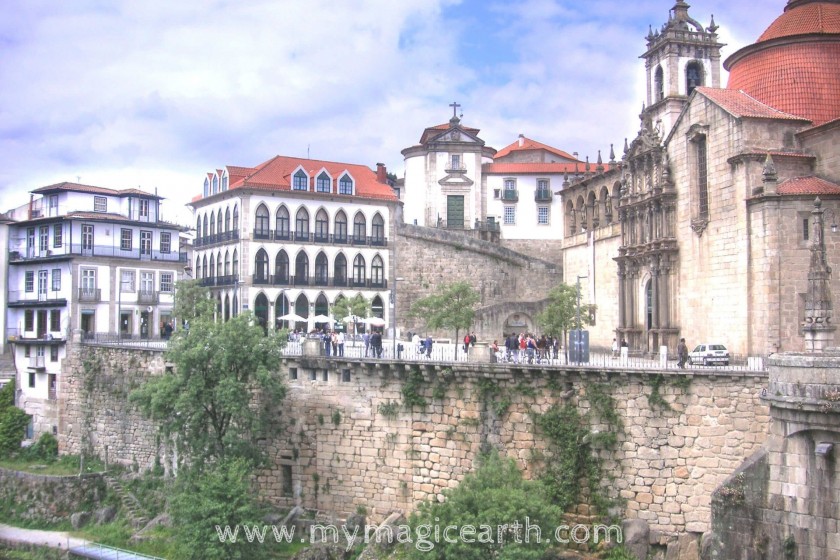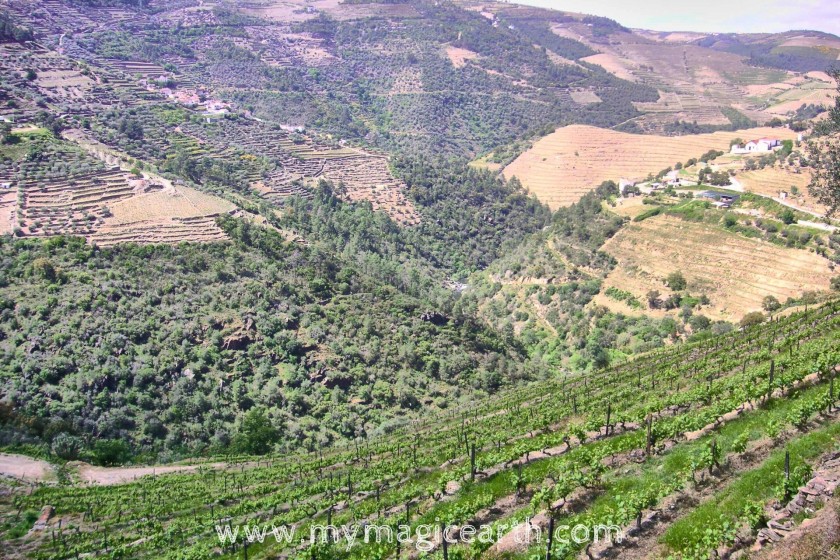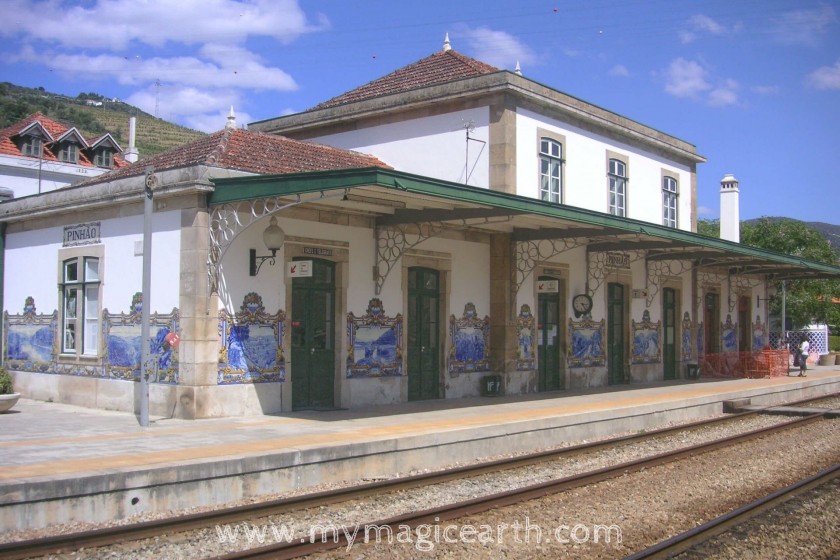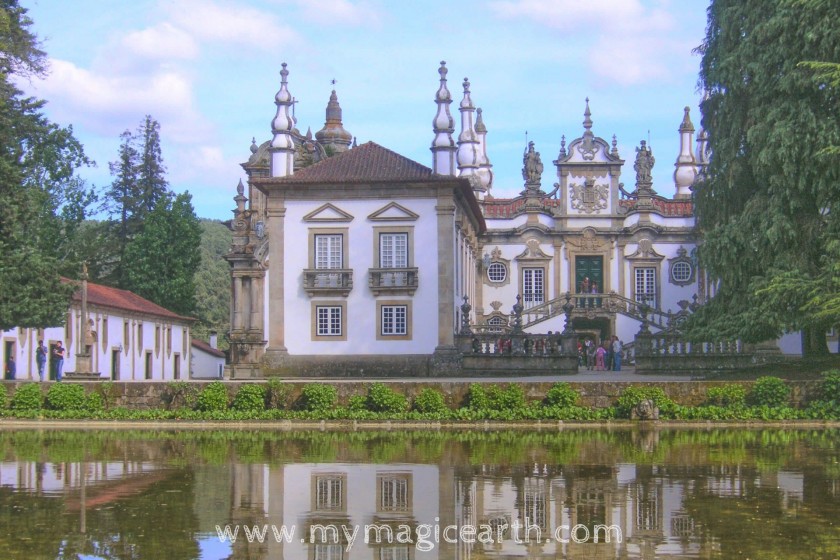A trip to the Douro valley is a must for wine lovers. Being the oldest demarcated wine region in the world, Douro Valley is proudly a UNESCO site. There are towns and villages in the region where many locate. Therefore, we had added several places to our trip to Porto without a second thought.
Our Douro Valley journey included these places:
-
- Amarante, a sleepy village with an old arched bridge
- Pinhão, a wine town encircled by terraced hills
- The Mateus Palace, a Baroque architecture near Vila Real
Amarante, a sleepy village with an old arched bridge
In the early morning, we arrived at the sleepy village, Amarante, the hometown of São Gonçalo, Portugal’s St Valentine. São Gonçalo was a monk and arrived in this area after completing a pilgrimage to Italy and Jerusalem. Amar is the Portuguese verb of love, perhaps that’s why it is part of the village’s name.
The river Tâmega runs through the town, and the arched bridge Ponte São Gonçalo crosses this waterway. The strategical place bridges helped local heroes’ resistance against Napoleon’s troops in the early 19th century.
Amarante is in the area of rich agricultural land that is famous for growing the grapes of the Vinho Verde, the young semi-sparkling green wine unique to Portugal.
The vineyards on steep slopes, deep river valleys, the tiny villages are the main scenes along the Douro Valley. While driving is the easy way to get to these villages, the best way to explore the landscape is to take a scenic train ride, which also includes such as a cruise tour and a regional lunch.

Pinhão, a wine town encircled by terraced hills
From Amarante, we changed to the local roads N101/N108 and crossed the Douro River to reach Pinhão.
The landscape of Pinhão
Surrounded by terraced hillsides, Pinhão sits on a particularly lovely curve of the Rio Douro. The small town is quiet and calm during the late Spring of the year. And, terraced vineyards and farmhouses covered the gorgeous hills. In Springtime, the valley was e
A friendly hotel with wine tasting
Built on the site of an 18th-century wine estate, the Vintage House Hotel stands out among the other buildings and is perfectly aligned next to the river between the bridge and the train station. This luxury hotel overlooks and the . It has an outdoor with panoramic and offers spacious guestrooms with furnished balconies.
The hotel also operates regular wine-tastings and courses such as the main types of grape, how the wine is produced, which bottles to buy, and how they should be stored.
Point of interests
The train station is also an example of using the azulejos (hand-painted tiles) to tell stories of the grape harvest. While the village itself is of little interest, the vineyard estates and the landscape are very famous and unique. Some vineyards, such as Taylor’s Quinta de Vargellas and Symingtons’ Quinta do Vesúvio, both of which have their private railway stations.
Join a tour
If you spend some small money, you can enjoy a 2-hour traditional Rabelo boat tour on a very secretive breathtaking stretch of the Douro river. Cruise between wonderful vineyards and terraces, reaching the Tua area before you return.
Or, you can join a Pinhão and Douro Valley day cruise from Porto.
Try the local drink
Before continuing our journey of the day, we had a short break in a local bar. Being the only guests in the bar, the owner of the bar offered us a local drink, the Vinho Verde (green wine). He tried to communicate with us in English, but unfortunately, his English was not clear enough for us to understand. Nevertheless, with the help of body language, we could still “talk” as if we were old friends. A touch of the local culture.


The Mateus Palace, a Baroque architecture near Vila Real
Not far from Pinhão is the next village Vila Real. Vila Real used to be the headquarter of the wine and port trade before Porto.
The must-visit in Duoro Valley is the most famous Mateus Palace, located 3 kilometres east of Vila Real. Constructed in a perfect example of Baroque architecture, it used to be a holiday home by the Portuguese royal family during the sixteenth and seventeenth centuries.
The Mateus Palace is featured on bottles of well-known Mateus rose wine. This locally made sparkling pink and slightly sweet rosé wine is perfect with salad and meat. Usually, I like to drink it in the summertime.
The palace has stucco walls and extravagantly carved stonework in the typical local baroque style of architecture. Its formal gardens feature a 35 metres long cedar-shaded tunnel. The beautiful garden landscape is also worth a visit.

Summary of our trip
Self-driving or join a tour
While the rental car gave us the mobility of traveling around, the driving wasn’t so easy. It also took time due to the speed limit. Since the landscape of Duoro Valley is strikingly beautiful, the best way to explore the area is either by boat or by train.
Tours with various activities are available at a low budget level. So save the driving time (around 200 km we drove on that day), you could join a tour in Porto, such as Douro Valley tour with wine tasting, river cruise and lunch. It has got thousands of reviews.
The must-see place
Since we hurried to the three places, we didn’t have enough time for Pinhão, where many activities take place. For the port wine lovers, this is a must-see place. You can join a tour with wine tasting & lunch in Pinhão starting in Porto. This tour sets the focus on the vineyards, food, wine in Pinhão, while you can also explore the breathtaking views of the Duoro Valley landscape.
Stay overnight
If you want to explore the region by yourself, I would recommend staying overnight in Pinhão since many activities take place around there. For example, take a wine tasting, boat tour, or a train tour. And, you could also explore the Regua and nearby villages from Pinhão as well.
Other than the above mentioned Vintage House Hotel, the Casas Botelho Elias, a self-catering holiday home in a natural setting is also a good choice.

Wow! I love little sleep towns to explore and that Vintage House Hotel looks like a great place to stay!